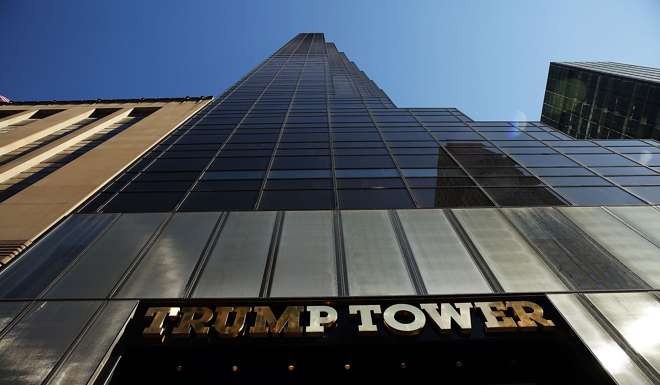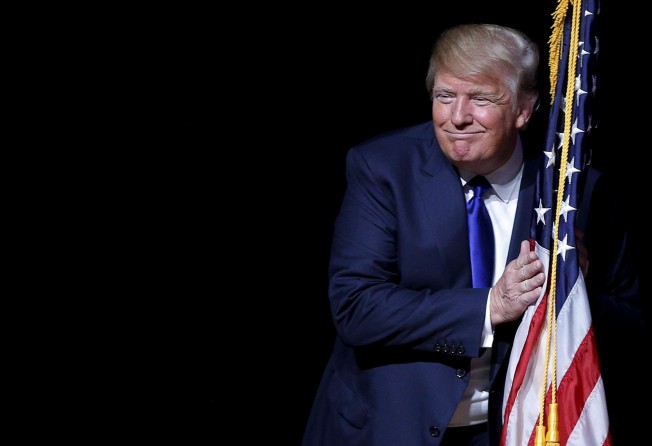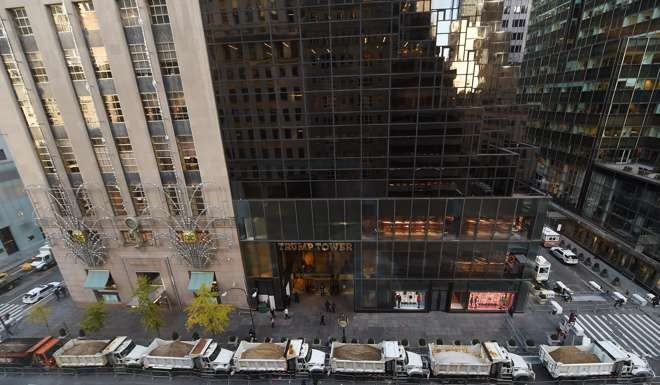
Why Trump’s ties with a Chinese state bank raise fears over president-elect’s ‘conflicts of interest’
Lawyers argue president-elect’s business ties with organisations including the Industrial & Commercial Bank of China could breach the US Constitution

The Industrial & Commercial Bank of China, a state-controlled enterprise and the world’s biggest lender by assets, is due to renegotiate its lease at Trump Tower in Manhattan during Donald Trump’s presidency, a business matter that may raise constitutional questions for the incoming president, ethicists say.
The bank’s lease is slated to end in October 2019, adding its renewal to the list of potential conflicts of interest for president-elect Trump, who has vowed to slap steep tariffs on Chinese imports and declare China a currency manipulator.
The lease is no small matter for the Trump Organization. ICBC was Trump Tower’s largest office tenant as of 2012, occupying 11 per cent of its office space, according to mortgage documents filed by Wells Fargo & Co. that year.
The relationship between Trump and ICBC is one of the clearest financial connections between the president-elect and a foreign government and it highlights the potential conflicts of interest that could spring from his sprawling business empire. While presidents are exempt from many rules designed to prevent such conflicts, the US Constitution bars all US officials from receiving gifts or payments from foreign governments under the so-called “emoluments” clause.
That clause has never been litigated, but it could be interpreted to extend to business transactions that are not conducted at market rates, said Richard Painter, a University of Minnesota law professor who was President George W. Bush’s chief ethics lawyer.
“It could be a problem if they pay anything more than the market rate or the market rate has changed somehow by the fact that he’s president,” Painter said. “Any concessions to him by the bank could be viewed as a gift, as a monetary value.”
An ICBC spokesman declined to comment on the matter. Trump’s transition team did not respond to emailed requests for comment.
But in an interview with The New York Times last week, he mentioned his plan to transfer management of his company to his adult children, Ivanka, Donald Junior and Eric Trump.

Ethics lawyers say that plan does not go far enough to insulate Trump from his business interests. In his interview with the Times, Trump said a sitting president “can’t have a conflict of interest”. Ethicists have recommended that he divest from his signature real estate holdings - as difficult as that may be - and move the resulting, more liquid assets into a blind trust.
I love China! The biggest bank in the world is from China. You know where their United States headquarters is located? In this building, in Trump Tower
Media reports since Trump’s November 8 election victory have focused on a series of potential conflicts of interest involving the billionaire’s global business holdings.
For example, Trump’s partner in a building in Manila was also named an envoy to the US in October and Jose E.B. Antonio, said he hopes to expand his collaboration with the Trump Organisation. Trump also met with three partners in a development in India, according to media reports, and foreign diplomats have been gathering at his newly opened hotel just blocks from the White House, according to The Washington Post.
Trump Tower’s lease arrangement with ICBC is yet another example. As of September 2012, the bank paid US$95.48 per square foot for its Trump Tower space, more than any other major office tenant in the tower, the Wells Fargo filing shows. For ICBC’s 20,404 square feet, that’s almost US$1.95 million a year. The document, compiled for investors considering buying a piece of Trump’s US$100 million in debt against his tower, is the latest available with the tenant data.
Trump’s election victory has raised fears of a trade war between the world’s two biggest economies. On the campaign trail, he called China “the single greatest currency manipulator that’s ever been on this planet” and blamed the country for stealing American jobs. At the same time, Trump boasted of his relationship with the Chinese bank.
“I love China!” he said in June 2015 at the start of his campaign. “The biggest bank in the world is from China. You know where their United States headquarters is located? In this building, in Trump Tower.”
Far from hiding what many experts have described as a potential conflict of interest, Trump routinely cited the bank’s tenancy as proof of the strength of his relationship with the Chinese and his skill at negotiating.
“I do deals with them all the time,” he told The Washington Post in March when asked about the ambitions of the world’s most populous country for the key South China Sea waterway. “The largest bank in the world, 400 million customers, is a tenant of mine in New York, in Manhattan.”
Many experts say Trump’s business relationship with ICBC could run afoul of the constitution, Painter said. They think the US president is not allowed to receive payment for services of any kind under the emoluments clause, regardless of whether they’re at fair market value, he said.
If we start to see foreign governments providing gifts directly to the president, that would be problematic
Trump would need to seek official advice from the Office of Legal Counsel at the US Department of Justice on what kind of payments he would be allowed to accept from an entity controlled by a foreign government, Painter said. Trump could avoid violating the emoluments clause altogether if he sells all his assets or gives them - not just their management - to his children, he said.
Norman Ornstein, a political scientist and resident scholar at the American Enterprise Institute, said he considered ICBC’s lease at Trump Tower a potential flashpoint for the incoming president. “That itself should violate the emoluments clause,” he said.
Others disagree. The emoluments clause is intended to deal with a gift or salary paid by a foreign leader or government to the president, said Robert Kelner, chairman of the election and political law practice at Covington & Burling.
“If we start to see foreign governments providing gifts directly to the president, that would be problematic,” Kelner said. “But ordinary course of business dealings between a state-owned enterprise and a bona fide corporation owned by the president won’t come anywhere close to violating the Constitution’s emoluments clause. The founders would have been surprised to learn that George Washington couldn’t sell his crops to a foreign chartered trading company.”
The questions may only get ironed out via litigation, Ornstein said. “I have little doubt that before very long, someone is going to challenge Trump for violation of the emoluments clause and his counsel will argue that it doesn’t apply to the president and it will make it into the courts,” he said.
Because hotels are generally considered a service industry, foreign diplomats paying to stay at Trump International Hotel in Washington could also be a violation of the emoluments clause, Painter said. And if ICBC’s lease agreement doesn’t include payment for services, it could be allowed if the rent rate passes the market test, he said.

The emoluments clause was written to prevent foreign governments’ using lavish gift-giving to influence US officials. It remains an obscure and untested part of the Constitution, but legal scholars who have studied it largely agree that the constitution gives Congress the strongest claim to determining the legitimacy of the payments, or even rejecting them.
In an extreme case, Congress, both houses of which are currently controlled by Republicans, also has the power to impeach and even remove the president for “treason, bribery, or other high crimes and misdemeanours”.
Impeachment over an emoluments clause violation is considered unlikely, but Trump’s administration could be tied up with information requests or public litigation over his business dealings in foreign countries, said Norman Eisen, a visiting fellow at Brookings Institution who previously served as the Obama administration’s ethics czar.
“There’s already a big public debate,” he said. Simultaneous questioning in Congress, the courts, and the minds of voters is “the tried and true formula” for enforcing ethical norms, he added.